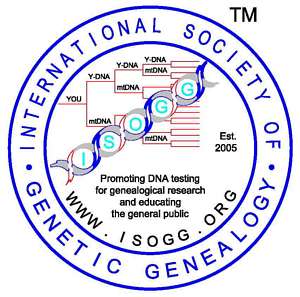Back to Y-DNA Tree Trunk
Back to SNP Index
Back to Papers/Presentations Cited
Back to Glossary Back to Listing Criteria
Copyright 2009. International Society of Genetic Genealogy. All Rights Reserved.

| LINKS: Main Page Y-DNA Tree Trunk SNP Index Papers/Presentations Cited Glossary Listing Criteria |
| CLADE/SUBCLADE SYMBOLS: Added Redefined |
| SNP SYMBOLS: Not on 2008 tree Confirmed within subclade Provisional Private |
Q M242
�
Q* -
�
Q1 P36.2
� �
Q1* -
� �
Q1a MEH2
� �
�
Q1a* -
� �
�
Q1a1 M120, M265/N14
� �
�
Q1a2 M25, M143
� �
�
Q1a3 M346
� �
� �
Q1a3* -
� �
� �
Q1a3a M3
� �
� � �
Q1a3a* -
� �
� � �
Q1a3a1 M19
� �
� � �
Q1a3a2 M194
� �
� � �
Q1a3a3 M199, P106, P292
� �
�
Q1a4 P48
� �
�
Q1a5 P89
� �
�
Q1a6 M323
� �
Q1b M378
NOTES:
Y-DNA haplogroup Q arose in Central Asia and migrated through the Altai/Baikal region of northern Eurasia into the Americas. Today it is found in North Eurasia, with some exemplars in European populations. The Q1a3a sub-group is almost exclusively associated with Native American populations.
References:
Bortolini et al,
Y-Chromosome Evidence for Differing Ancient Demographic Histories in the Americas.
American Journal of Human Genetics, 73:524-539, 2003.
Cinnioglu et al,
Excavating Y-chromosome Haplotype Strata in Anatolia. (pdf) Human Genetics. 114:127-148, 2004.
Deng et al, Evolution
and Migration History of the Chinese Population Inferred from the Chinese Y-chromosome Evidence.
(pdf) Journal of Human Genetics, 49:339-348, 2004.
Karafet et al,
New Binary Polymorphisms Reshape and Increase Resolution of the Human Y-Chromosomal Haplogroup
Tree. Abstract. Genome Research, published online April 2, 2008.
Supplementary Material.
Regueiro et al,
Iran: Tricontinental Nexus for Y-Chromosome Driven Migration. (abstract)
Human Heredity, Vol. 61, No 3, 132-143, 2006.
Sengupta et al,
Polarity and Temporality of High Resolution Y-chromosome Distributions in India
Identify Both Indigenous and Exogenous Expansions and Reveal Minor Genetic Influence
of Central Asian Pastoralists. (pdf)
American Journal of Human Genetics, 78:202-221, 2006.
Shen et al, Reconstruction
of Patrilineages and Matrilineages of Samaritans and other Israeli Populations from Y-Chromosome
and Mitochondrial DNA Sequence Variation. (pdf) Human Mutation, 24:248-260, 2004.
Su et al,
Y-chromosome Evidence for a Northward Migration of Modern Humans into Eastern Asia
during the Last Ice Age. (pdf) American Journal of Human Genetics, 65:1718-1724, 1999.
Underhill et al,
Detection of Numerous Y Chromosome Biallelic Polymorphisms by Denaturing High-performance Liquid Chromatography.
(Abstract) Genome Research, 7(10):996-1005, 1997 Oct.
Additional Resources:
Rebekah Canada, yDNA Haplogroup Q
Rebekah Canada, The yDNA Haplogroup Q Project
Ana Oquendo Pab�n, American Indian Q3 Haplogroup Project
Glinda Seabaugh, American Indian DNA Project
Corrections/Additions made since 1 January 2009:
Contact person for Haplogroup Q: Charles Moore
| Back to Main Page Back to Y-DNA Tree Trunk Back to SNP Index Back to Papers/Presentations Cited Back to Glossary Back to Listing Criteria Copyright 2009. International Society of Genetic Genealogy. All Rights Reserved. |

|